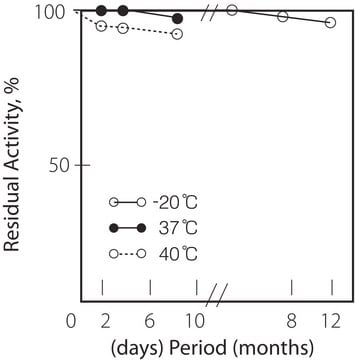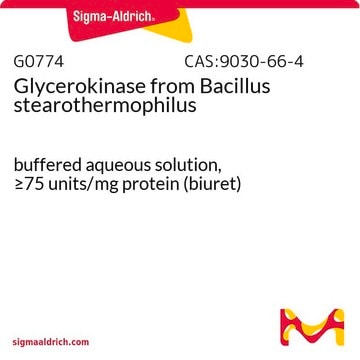G4509
Glycerokinase from Escherichia coli
lyophilized powder, 40-100 units/mg protein
Synonym(s):
ATP:glycerol 3-phosphotransferase, Glycerol Kinase
About This Item
Recommended Products
biological source
Escherichia coli
form
lyophilized powder
specific activity
40-100 units/mg protein
composition
Protein, ≥50% biuret
foreign activity
Triose-phosphate isomerase, hexokinase, myokinase, glycerol dehydrogenase and NADH oxidase ≤0.05%
storage temp.
−20°C
Looking for similar products? Visit Product Comparison Guide
Application
Biochem/physiol Actions
Unit Definition
Physical form
Signal Word
Danger
Hazard Statements
Precautionary Statements
Hazard Classifications
Resp. Sens. 1
Storage Class Code
11 - Combustible Solids
WGK
WGK 3
Flash Point(F)
Not applicable
Flash Point(C)
Not applicable
Personal Protective Equipment
Certificates of Analysis (COA)
Search for Certificates of Analysis (COA) by entering the products Lot/Batch Number. Lot and Batch Numbers can be found on a product’s label following the words ‘Lot’ or ‘Batch’.
Already Own This Product?
Find documentation for the products that you have recently purchased in the Document Library.
Customers Also Viewed
Protocols
Enzymatic assay of lipase type XIII from Pseudomonas sp. using a coupled enzyme system of glycerol kinase and glycerophosphate oxidase (EC 3.1.1.3)
Our team of scientists has experience in all areas of research including Life Science, Material Science, Chemical Synthesis, Chromatography, Analytical and many others.
Contact Technical Service










